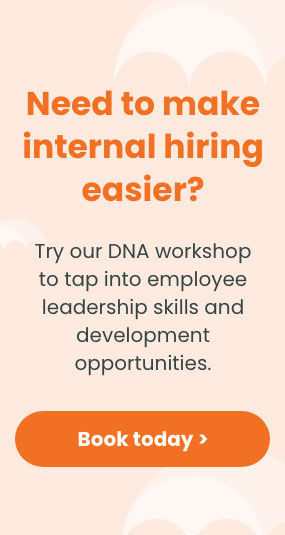Job interviews. Love them or loathe them, we all need them. Although we can probably all relate to the anxiety experienced when being an interviewee, conducting job interviews can be just as stress-inducing - particularly when not done correctly.
Recruiting for jobs is a costly procedure. According to industry mogul Glassdoor, the average employer spends around £3,000 and 27.5 days trying to source, interview and hire a new employee. That's a lot of time and resources to lose out on should the new hire go south, so if you value your time and your business, it's essential to streamline your hiring procedures and get the most out of each job interview you conduct.
From optimising your talent pool to asking the perfect interview questions, use our expert tips to become an effective interviewer and conduct your next round of job interviews with newfound ease.
Before the Interview
Know Exactly What You Want
When it comes to hiring, don't take a shot in the dark. Know exactly what job you need to fill, what skills and experience you need and what type of candidate you're looking for before conducting any interviews. By analysing your company's hiring needs in this way, you not only make the recruitment process a whole lot easier for yourself, but also optimise the quality and efficacy of your subsequent job interviews.
Have a Clear Job Description and RJP
When trawling through swathes of recruitment adverts, your job description is the first impression that a potential candidate has of the job, employer and company as a whole - so make it count. Job descriptions should provide a clear, in-depth summary of the role and the skills required to do that job effectively. Many prospective candidates also appreciate being given a Realistic Job Preview (RJP) as part of the job description. From these, they gain a realistic insight into what the job entails, the pros and cons of the role and what life as an employee for that organisation would be like.
However, less is more when it comes to effective job descriptions. Most job seekers skim-read recruitment adverts and tune out after a couple of seconds; particularly if they're not engaged. Use the criteria you've gathered from analysing your company's recruitment needs to establish a clear, concise job description that effortlessly seeks out and engages the right candidates. If you entice the best applicants to apply, this will only have a positive impact on the efficiency of your job interviews.
Keep Your Application Process Short and Sweet
Jobseekers are busy people. No one likes spending hours on a job application, let alone doing so just to be told that they don't meet the requirements. Long-winded, tiresome job applications not only prevent valuable candidates from applying in the first place, but are also one of the major reasons behind job candidates abandoning their applications and avoiding that employer in the future.
Take Advantage of Pre-Employment Skills Tests
When it comes to getting more out of your job interviews, pre-employment skills tests are always a good idea. Hiring managers can incorporate skills tests into their initial filtering process to prevent less skilled individuals from applying for the job. In doing so, you would not only narrow down and optimise your applicant pool, but also streamline your interview process to contain only the best potential candidates for the job. Every interview will be worthwhile, effective and high-quality; the only problem you'll have is deciding which amazing candidate to recruit!
Moreover, pre-employment testing can dramatically reduce the impact of unconscious bias when hiring. It completely eradicates the influence of any preconceived attitudes or prejudiced opinions, thus amplifying diversity within your talent pool. Diverse teams perform better, are more creative, have higher levels of engagement and lead to greater innovation, meaning there are truly no downsides to prioritising the diversity of your new hires.
If you're interested in learning more about how skills tests can benefit your company's interview procedures, just take a look through our online skills test library. From retail situational judgement tests to legal and logistics skills assessments, we have the ideal test for every employer. In the unlikely event that we don't have exactly what you're looking for, just get in touch with our friendly team to discuss our bespoke test offering.
During the Interview
Prepare, Prepare, Prepare
The first essential step for any interviewer is to know who the job applicants are. Before you conduct an interview, read through your candidate's resume, look through their LinkedIn profile and assess their application form. Not only will this help you know your interviewee better (and trust us, it's very obvious when an interviewer doesn't know their applicants!), but it will also help you generate effective interview questions. This is one of the most simple steps that you can take to get the most out of your job interviews.
Make Your Interviewee Feel at Ease
Whether for someone fresh out of university or an experienced interviewee, job interviews can be highly nerve-wracking. It is common for that stress and anxiety to have a somewhat negative effect on your candidate's performance, so help them to perform at their best by easing them into the interview and calming their nerves. Job interviews should be a professional conversation, not an interrogation. Interviewers should always start an interview by introducing themselves, the company and the role. They should then tell the candidate what to expect during the interview and the next steps involved in the recruitment process. Allow the candidate some time to introduce themselves and who they are before getting stuck into the meatier interview questions and role-specific discussions. By doing this, you'll help build a rapport (which is great for a positive candidate experience) and create an effective, high-quality interview environment. You don't want to miss out on an exceptional candidate just because some nerves got in the way. When it comes to recruitment, diamonds aren't always made under pressure!
Use Consistent Interview Questions
Having a structured interview procedure can really help when it comes to scoring your applicants' interview performance. Although it's great to ask applicant-specific questions to gain a better insight into their experience, skills and personality, it would be wise to avoid making your interviews completely unstructured if you want to get the most out of them and effectively compare candidates.
Communicate Effectively
Many of us have experienced the awkwardness of a rude interviewer who makes little effort to communicate effectively. Strong communication skills are a basic expectation of any interviewer, hiring manager and employer as well as the interviewee. Not only is it just common decency, but it dramatically improves the quality and efficacy of an interview. Whether you're conducting face-to-face, phone or online interviews, prioritise your verbal and non-verbal communication. Give appropriate eye contact (for example, not staring or constantly looking down at your notepad), display warm body language, ask open questions and actively listen to what your interviewee is saying.
Make Room for Questions
A good interview should be a two-way conversation, with both the interviewer and interviewee having ample time to ask and answer essential and follow-up questions. Such opportunities allow the candidate to learn more about the job, workplace and expectations of the role. Moreover, they help the interviewer gather helpful evidence as to which candidate is most suited to the job.
Focus on Skills vs. Experience
Increasingly, more employers are steering away from traditional qualification and experience-based hiring and instead discovering the many benefits of skills-based hiring. Just like you wouldn't hire a chef without tasting their food, conducting recruitment based solely on a person's education, qualifications and experience is not the most reliable way of securing high-performing employees. Instead, focus more on an applicant's skill set and aptitude for job-specific tasks and responsibilities. In doing so, you'll filter out applicants who can talk the talk but not walk the walk, and optimise your interview process. An easy and cost-effective way to do this is through psychometric skills and personality testing.
Always Ask For Examples
Similarly, whenever an interviewee lists their skills and abilities for any given role, always ask for examples. This demonstrates that the applicant can put their abilities and skills into practice in the workplace, which is vital for productivity and innovation.
Assess Whether The Interviewee is a Culture Add or Culture Fit
Company culture is a term thrown around a lot nowadays - and for good reason. Workplace culture can make or break a team's productivity, morale, satisfaction and reputation. However, as much as you should aspire to create a strong company culture and seek out people who align with your values, you also don't want to create an echo chamber of similar people, interests and opinions. This weakens diversity and leaves your organisation without the exceptional benefits that it brings to a team. Have the interviewer play close attention to the applicant's soft skills, behaviour towards other team members during group interviews, personal experiences and viewpoints and non-job-related interests to discern whether they will be a good addition to your company culture.
After the Interview
Debrief With Fellow Interviewers
If you conduct your job interviews with other colleagues, make sure to debrief after the interview. Five or ten minutes of analysing the applicant's answers as a team, comparing views and sharing insights and reflections can really help with decision-making. One interviewer may spot something that another completely missed or provide an interesting perspective that could end up changing who you hire. You really can't underestimate the power of a good post-interview debrief.
Assess and Compare Interviewee Scores
As much as you should listen to your gut when it comes to hiring a new employee, you also cannot disregard the quantitative data of candidates' test scores or interview performance. Make sure to properly compare your interviewees' responses and scores - as well as their behaviour and charisma in the interview - to make an informed hiring decision.
Always Respond, Even to Give Rejections
It's disheartening and frustrating to not hear back from an interviewer about the outcome of your interview. Although we like to think most companies would never 'ghost' their interviewees, it's definitely not a rarity for applicants to not hear back from an employer at all. Regardless of whether you're delivering a job offer or rejection, a golden rule and expectation of conducting interviews is to always respond to your applicant and provide feedback about their interview.
Ask for Interviewee Feedback
Last, but certainly not least, strongly consider sending out a post-interview follow-up candidate experience questionnaire. This should ask for your interviewees' feedback on the application process, interview and (if applicable) onboarding procedures in your company. As well as being a great way of measuring candidate experience, it also allows you to improve your recruitment and interview processes so that you can continue getting the most out of your interviews for many years to come.
Take a look through our skills test, personality test, realistic job preview and video interview offering and optimise your interview process today.




